

July 15th, 2014. How to Miss By a Mile: An Alternative Look at Uber’s Potential Market Size. July 11, 2014: July 11, 2014: On June 18, Aswath Damodaran, a finance professor at NYU’s Stern School of Business, published an article on FiveThirtyEight titled “Uber Isn’t Worth $17 Billion.”
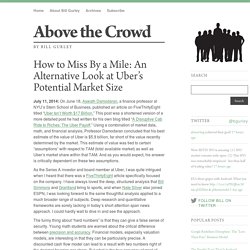
This post was a shortened version of a more detailed post he had written for his own blog titled “A Disruptive Cab Ride to Riches: The Uber Payoff.” Using a combination of market data, math, and financial analysis, Professor Damodaran concluded that his best estimate of the value of Uber is $5.9 billion, far short of the value recently determined by the market.
This estimate of value was tied to certain “assumptions” with respect to TAM (total available market) as well as Uber’s market share within that TAM. And as you would expect, his answer is critically dependent on these two assumptions. Do You Feel Pressure Or Do You Apply Pressure? To whoever think their words affect me is too stupidAnd if you can do it better than me, then you do it—Kanye West, “Cold” One obvious yet under-appreciated law of business physics is: For any given company, the larger the company becomes, the more opportunities emerge to screw it up.

Another obvious but not well-understood law: The more screwed up your company, the more people will complain about it and blame you. If we take these two together, it is easy to see that without intervention, the larger your company becomes, the more people will complain and blame you. This seems simple enough, but CEOs often fail to understand the logic, become overwhelmed by the criticism, lose confidence in themselves, and decide that they are no longer capable of running their own companies. If you are a logical and open-minded person, it is difficult not to take a 10X increase in criticism seriously. Let’s begin by looking at the overwhelming spiral. The Secrets Behind Many Successful Startups. “What is your startup’s unfair advantage?”
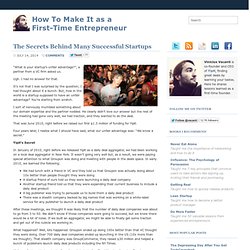
, a partner from a VC firm asked us. Ugh. I had no answer for that. It’s not that I was surprised by the question; I had thought about it a bunch. But, how in the world is a startup supposed to have an unfair advantage? I sort of nervously mumbled something about our domain expertise and the partner nodded. That was June 2010, right before we raised our first $1.3 million of funding for Yipit. Beware the ‘Edifice Complex’ — and 9 Other Ways to Damage a High-Growth Startup. Here are 10 ways to damage your fast-growing tech startup – and hurt the perception of Silicon Valley in the process.
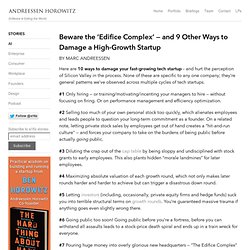
None of these are specific to any one company; they’re general patterns we’ve observed across multiple cycles of tech startups. #1 Only hiring — or training/motivating/incenting your managers to hire — without focusing on firing. Or on performance management and efficiency optimization. #2 Selling too much of your own personal stock too quickly, which alienates employees and leads people to question your long-term commitment as a founder. On a related note, letting private stock sales by employees get out of hand creates a “hit-and-run culture” — and forces your company to take on the burdens of being public before actually going public. #3 Diluting the crap out of the cap table by being sloppy and undisciplined with stock grants to early employees.
. #6 Going public too soon! #8 Assuming more cash is always available at higher and higher valuations, forever. Related. Startup = Growth. September 2012 A startup is a company designed to grow fast.
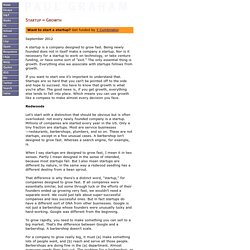
Being newly founded does not in itself make a company a startup. Nor is it necessary for a startup to work on technology, or take venture funding, or have some sort of "exit. " Competition is overrated. Your #1 competitor starting out will always be the BACK button, nothing else. – Garry Tan Suppose you have an idea for a startup, and then do some research only to discover there are already similar products on the market.
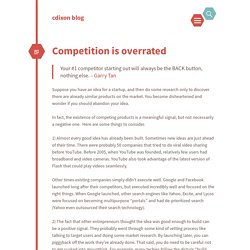
You become disheartened and wonder if you should abandon your idea. In fact, the existence of competing products is a meaningful signal, but not necessarily a negative one. Here are some things to consider. 1) Almost every good idea has already been built. Other times existing companies simply didn’t execute well. 2) The fact that other entrepreneurs thought the idea was good enough to build can be a positive signal. 3) That other people tried your idea without success could imply it’s a bad idea or simply that the timing or execution was wrong. Startups are primarly competing against indifference, lack of awareness, and lack of understanding — not other startups. The Rule of 3 and 10. The Rule of 3 and 10 One of the best pieces of advice I ever received came from Hiroshi Mikitani, the CEO of Rakuten, the Japanese retailer.
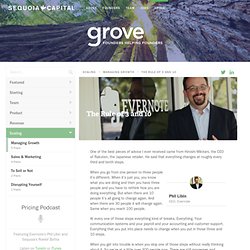
He said that everything changes at roughly every third and tenth steps...